- Clone
- RI7217 (See other available formats)
- Regulatory Status
- RUO
- Other Names
- Transferrin receptor, T9
- Isotype
- Rat IgG2a, κ
- Ave. Rating
- Submit a Review
- Product Citations
- publications
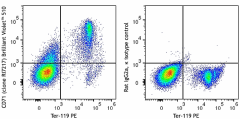
-

C57BL/6 mouse bone marrow cells were stained with Ter-119 PE and CD71 (clone RI7217) Brilliant Violet™ 510 (left) or rat IgG2a, κ Brilliant Violet™ 510 isotype control (right). Data shown was gated on total bone marrow cells.
| Cat # | Size | Price | Quantity Check Availability | Save | ||
|---|---|---|---|---|---|---|
| 113823 | 50 µg | 278 CHF | ||||
CD71 is a 95 kD type II heterodimeric transmembrane glycoprotein that is also known as T9 and transferrin receptor. CD71 is expressed on proliferating cells, reticulocytes, and erythroid precursors. Its expression is very low on resting leukocytes. CD71 plays a role in the control of cellular proliferation by facilitating the uptake of iron via ferrotransferrin binding and the recycling of apotransferrin to the cell surface.
Product DetailsProduct Details
- Verified Reactivity
- Mouse
- Antibody Type
- Monoclonal
- Host Species
- Rat
- Formulation
- Phosphate-buffered solution, pH 7.2, containing 0.09% sodium azide and BSA (origin USA).
- Preparation
- The antibody was purified by affinity chromatography and conjugated with Brilliant Violet 510™ under optimal conditions.
- Concentration
- 0.2 mg/ml
- Storage & Handling
- The antibody solution should be stored undiluted between 2°C and 8°C, and protected from prolonged exposure to light. Do not freeze.
- Application
-
FC - Quality tested
- Recommended Usage
-
Each lot of this antibody is quality control tested by immunofluorescent staining with flow cytometric analysis. For flow cytometric staining, the suggested use of this reagent is ≤ 0.5 µg per million cells in 100 µl volume. It is recommended that the reagent be titrated for optimal performance for each application.
Brilliant Violet 510™ excites at 405 nm and emits at 510 nm. The bandpass filter 510/50 nm is recommended for detection, although filter optimization may be required depending on other fluorophores used. Be sure to verify that your cytometer configuration and software setup are appropriate for detecting this channel. Refer to your instrument manual or manufacturer for support. Brilliant Violet 510™ is a trademark of Sirigen Group Ltd.
Learn more about Brilliant Violet™.
This product is subject to proprietary rights of Sirigen Inc. and is made and sold under license from Sirigen Inc. The purchase of this product conveys to the buyer a non-transferable right to use the purchased product for research purposes only. This product may not be resold or incorporated in any manner into another product for resale. Any use for therapeutics or diagnostics is strictly prohibited. This product is covered by U.S. Patent(s), pending patent applications and foreign equivalents. - Excitation Laser
-
Violet Laser (405 nm)
- Application Notes
-
Additional reported applications (for the relevant formats) include: blocking of cellular proliferation. The Ultra-LEAF™ purified antibody (Endotoxin < 0.01 EU/µg, Azide-Free, 0.2 µm filtered) is recommended for functional assays (Cat. Nos. 113821 & 113822).
This clone may also be known as R17217 or R17 217. -
Application References
(PubMed link indicates BioLegend citation) - RRID
-
AB_2783053 (BioLegend Cat. No. 113823)
Antigen Details
- Structure
- Transferrin receptor and is 95 kD.
- Distribution
-
Most dividing cells, the brain endothelium, and cycling hematopoietic progenitors.
- Function
- Mediates iron uptake.
- Ligand/Receptor
- Transferrin.
- Cell Type
- Hematopoietic stem and progenitors
- Biology Area
- Immunology
- Molecular Family
- CD Molecules
- Antigen References
-
1. Hentze MW, et al. 1996. P. Natl. Acad. Sci. USA 93:8175.
2. Trowbridge IS, et al. 1993. Annu. Rev. Cell Biol. 9:129.
3. Trowbridge I, et al. 1982. J. Cell Physiol. 112:403.
4. Kuhn LC, et al. 1984. Cell 37:95. - Gene ID
- 22042 View all products for this Gene ID
- UniProt
- View information about CD71 on UniProt.org
Related FAQs
Other Formats
View All CD71 Reagents Request Custom Conjugation| Description | Clone | Applications |
|---|---|---|
| Biotin anti-mouse CD71 | RI7217 | FC |
| FITC anti-mouse CD71 | RI7217 | FC |
| PE anti-mouse CD71 | RI7217 | FC |
| Purified anti-mouse CD71 | RI7217 | FC |
| PE/Cyanine7 anti-mouse CD71 | RI7217 | FC |
| Brilliant Violet 421™ anti-mouse CD71 | RI7217 | FC |
| PerCP/Cyanine5.5 anti-mouse CD71 | RI7217 | FC |
| APC anti-mouse CD71 | RI7217 | FC |
| Ultra-LEAF™ Purified anti-mouse CD71 | RI7217 | FC |
| PE/Dazzle™ 594 anti-mouse CD71 | RI7217 | FC |
| Brilliant Violet 510™ anti-mouse CD71 | RI7217 | FC |
| TotalSeq™-A0441 anti-mouse CD71 | RI7217 | PG |
| TotalSeq™-C0441 anti-mouse CD71 | RI7217 | PG |
| APC/Fire™ 750 anti-mouse CD71 | RI7217 | FC |
| TotalSeq™-B0441 anti-mouse CD71 | RI7217 | PG |
Customers Also Purchased
Compare Data Across All Formats
This data display is provided for general comparisons between formats.
Your actual data may vary due to variations in samples, target cells, instruments and their settings, staining conditions, and other factors.
If you need assistance with selecting the best format contact our expert technical support team.
-
Biotin anti-mouse CD71
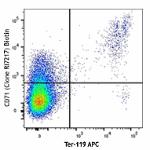
C57BL/6 mouse bone marrow cells were stained with Ter-119 AP... 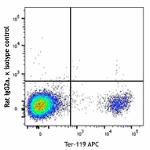
-
FITC anti-mouse CD71
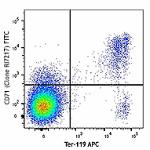
C57BL/6 mouse bone marrow cells were stained with Ter-119 AP... 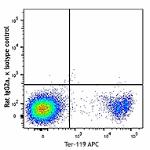
-
PE anti-mouse CD71
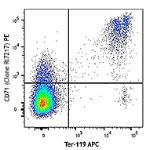
C57BL/6 mouse bone marrow cells were stained with Ter-119 AP... 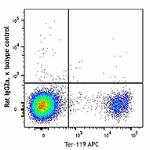
-
Purified anti-mouse CD71
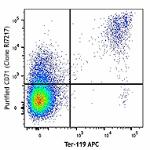
C57BL/6 mouse bone marrow cells were stained with Ter-119 AP... 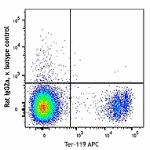
-
PE/Cyanine7 anti-mouse CD71

C57BL/6 mouse bone marrow cells were stained with TER-119 AP... -
Brilliant Violet 421™ anti-mouse CD71
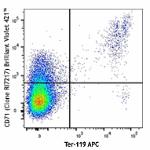
C57BL/6 mouse bone marrow cells were stained with Ter-119 AP... 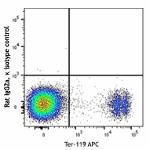
-
PerCP/Cyanine5.5 anti-mouse CD71

C57BL/6 mouse bone marrow cells were stained with Ter-119 AP... -
APC anti-mouse CD71

C57BL/6 mouse bone marrow cells were stained with Ter-119 PE... -
Ultra-LEAF™ Purified anti-mouse CD71

C57BL/6 mouse bone marrow cells were stained with Ultra-LEAF... -
PE/Dazzle™ 594 anti-mouse CD71

C57BL/6 mouse bone marrow cells were stained with Ter-119 Al... -
Brilliant Violet 510™ anti-mouse CD71

C57BL/6 mouse bone marrow cells were stained with Ter-119 PE... -
TotalSeq™-A0441 anti-mouse CD71
-
TotalSeq™-C0441 anti-mouse CD71
-
APC/Fire™ 750 anti-mouse CD71

C57BL/6 mouse bone marrow cells were stained with anti-mouse... -
TotalSeq™-B0441 anti-mouse CD71
 Login / Register
Login / Register 











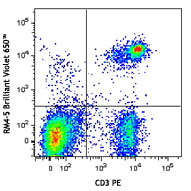
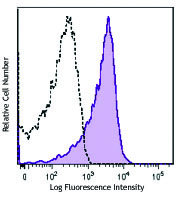
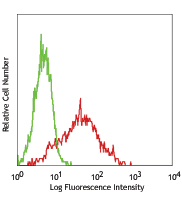
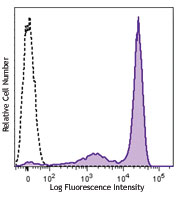



Follow Us